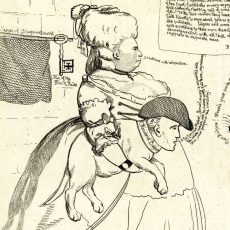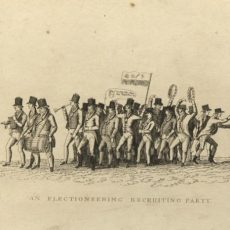Apr
1754
oxfordshire
Contested
GENERAL ELECTION
Poll book data from:
Citation: A copy of the poll… (Oxford: the Theatre, 1754)
Source: John Sims (ed.), A Handlist of British Parliamentary Poll Books (Leicester, 1984); Jeremy Gibson and Colin Rogers (eds.), Poll Books, 1696–1872: A Directory of Holdings in Great Britain (4th edn., Bury, 2008).
Timeline & Key Statistics
Contexts & Remarks
Dates: Wednesday 17 Apr.-Tuesday 23 Apr. 1754.
Poll book reference: The poll of the freeholders... (Oxford: Printed at the Theatre, 1754).
Prior to the 1754 election, Oxfordshire's elections were very peaceful and uncontested affairs. The peace of the county was broken in 1752 with the beginning of what would be a fierce and immensely expensive two-year campaign by the Whig New Interest to overthrow the Tory Old Interest in advance of the 1754 general election. A revived Whig interest, led by influential local peers with close connections to the Administration and the court — the duke of Marlborough and Lords Macclesfield and Harcourt — was assisted financially by the Pelham Administration. Elite women were also involved in canvassing for the New Interest, including Lady Susan Keck, Lady Dalkeith, and Lady Talbot.
Candidates: Philip Wenman, 3rd Viscount Wenman (Tory); Sir James Dashwood (Tory); Thomas Parker, Viscount Parker (Whig); and Sir Edward Turner (Whig).
Viscount Wenman of Thame Park came from an established family which had represented the county since the sixteenth century. He had been returned as MP for Oxford in 1749 before setting his sights on a county seat. As cousins, Wenman and Dashwood ran in harnessin harness together as the Old Interest Tory candidates. Over the course of the election, expenses for the Tory campaign amounted to £20,000, of which Dashwood and Wenman paid over 25 per cent. £8,000 were paid by public subscription.
Viscount Parker was the son of the earl of Macclesfield. He had previously served as MP for Newcastle-under-Lyme from 1747 to 1754. His campaign was supported by the duke of Marlborough, Lord Macclesfield, and Lord Harcourt. Prime Minister Henry Pelham promised £7,000 towards the Whig campaign 'with the King's consent and knowledge' (BL Add. Ms 32,853, f.460) As a New Interest candidate, He ran in harnessin harness with Sir Edward Turner, the son of a merchant and director of the East India Company.
During the polling in Broad Street, Oxford, Old Interest supporters blocked access to the polls to prevent New Interest supporters from voting. However, Exeter College allowed New Interest voters to bypass the crowd and access the polls from behind from the college's side entrance. Following the poll, a scrutiny was demanded by Parker and Turner, which ultimately disqualified 347 Old Interest votes.
A double return, returning all four candidates, was made, though both pairs petitioned the result. Over 1,000 votes cast were challenged beginning in 1755. After an extended hearing in the House, Parker and Turner were seated. The cost, effort and vitriol of the 1754 election was such that neither party was keen to see it repeated. As a result, the leaders of the two parties came to a compromise and agreed to split the seats in 1760.
Cultural Artefacts
Poll Book
Below is a digitised version of the poll book for this election:















